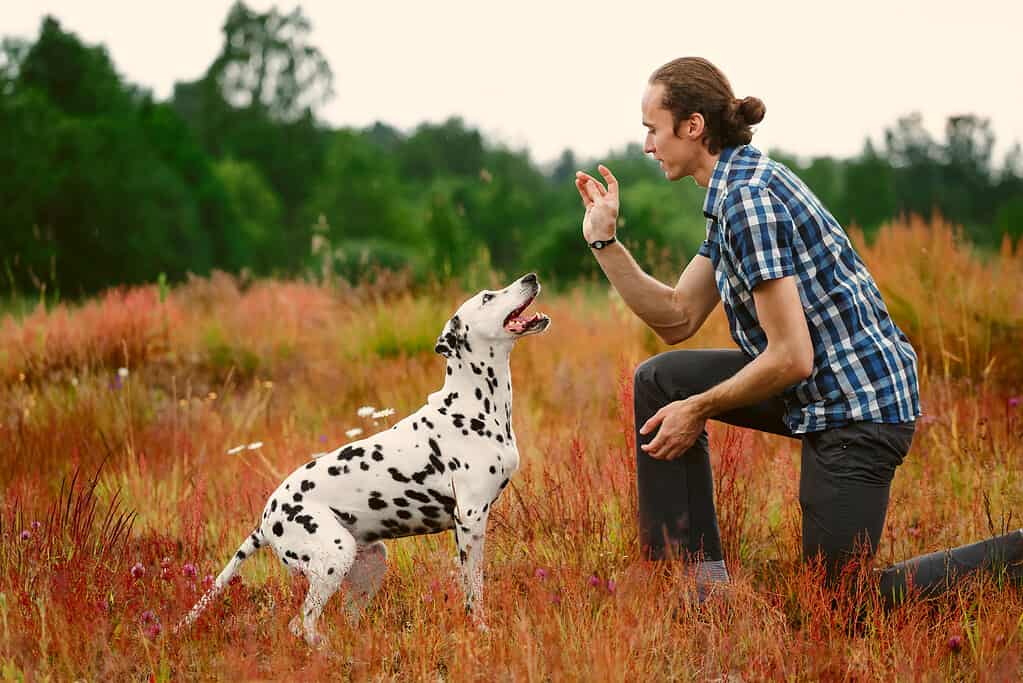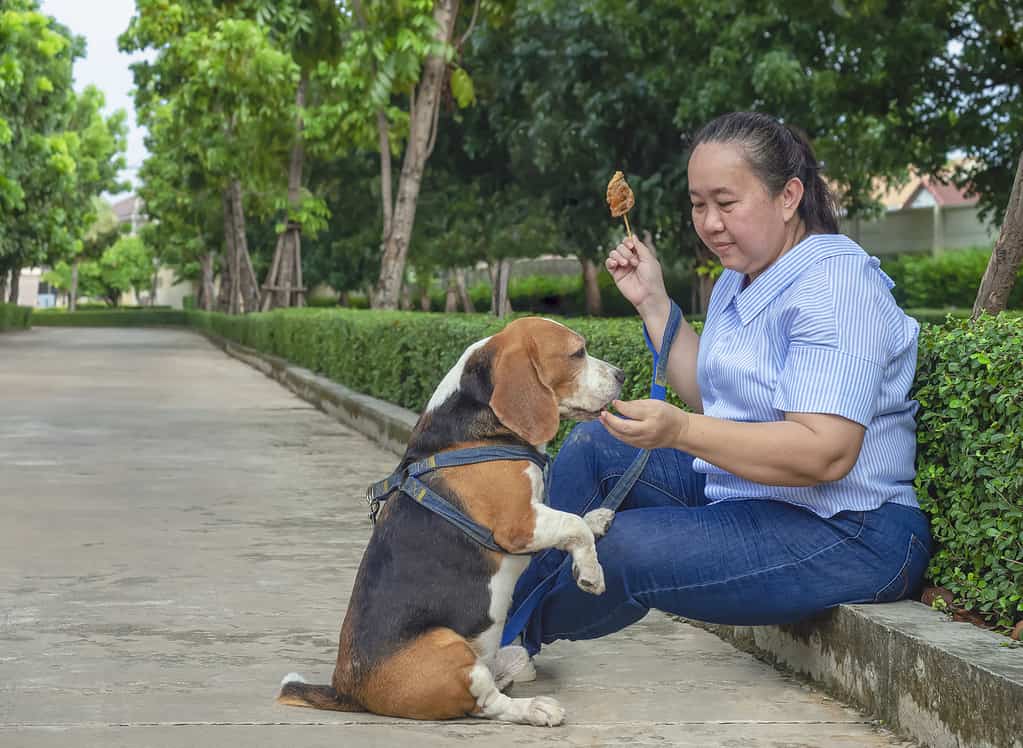Both group and private dog training sessions offer invaluable insights into dog training. However, they are not created equal. While private dog training is often more expensive, that doesn’t mean it’s better. In fact, we recommend group training sessions for most dogs (and not because they are cheaper).
That said, each dog is an individual. Each type of training has its advantages and disadvantages. Choosing the right choice for your dog is vital for their training success.
We’ll dive into the pros and cons of group vs. private dog training sessions in this article. In the end, you should be able to choose the right training option for your canine.
Why Choose Group Training

Dog training classes teach you how to properly train and cue your dog. They don’t train your dog for you. Your success will depend on how much you practice at home.
©Aleksandr Zotov/iStock via Getty Images
There are tons of reasons we recommend group training classes, such as:
Cost
Group training is advantageous for several reasons. On the surface, it’s easy to see that group training is much cheaper than private sessions. Often, you can get a series of sessions for the same price as one private session.
Cost can be a huge factor for new dog owners. Many owners may not want to spend tons on training classes after spending hundreds (or thousands) on a puppy and new supplies. With the popularity of YouTube and the internet, many dog owners attempt training themselves instead of working with a professional.
Some training classes are always better than none, and group classes shouldn’t be looked down upon just because they are cheaper. The lower cost can be a great benefit when choosing group training classes.
Socialization
The main reason we recommend group training classes is for socialization. Puppies and younger dogs can benefit from the social aspect of group classes. They can learn to interact with other puppies and strangers in a safe, controlled environment.
Many group classes have an explicit socialization portion. However, even if your group class doesn’t, just being around other dogs without negative consequences can help socialize your puppy.
Socialization is one of the most important things you can do to help ensure your dog grows into a well-adjusted adult. Introducing your dog to different people, places, and other animals prevents behavioral problems later on, including fear-driven aggression.
Socialized dogs are also more likely to engage properly with humans. They learn how to play with other people and dogs properly because they have practiced.
Dogs have to learn good manners just like human children. Group training classes can help in this regard, while private sessions do not.
Group Learning
Did you know that dogs can learn from each other? This process is called “mirror learning.” Simply put, dogs can learn by observing other dogs. If your canine watched another dog perform a command, they may learn how to do it themselves. In fact, after only a few observed sessions, many dogs repeated at least 75% of the taught behaviors.
Of course, this makes sense. We learn the same way. However, many people forget that their dogs are social animals and participate in social learning.
When you take your dog to group classes, they will see other dogs performing the exact same commands you’re teaching them. This observation helps them learn the commands even faster.
Learning from Others
You also learn from others in a group setting. You’ll get to see how several different owner-dog pairs perform the commands and learn from their successes (and mistakes). Humans are also social learners, and dog training is more about you learning how to train your dog than your dog learning anything directly from the trainer.
Plus, more diverse training hiccups occur in group training classes. Others will have problems that you don’t currently have. However, that doesn’t mean you won’t experience these roadblocks later.
By getting exposed to how other people solve common training problems, you’ll be more prepared when they pop up in your life.
Why Not to Choose Group Training

Make sure to always research the type of training a trainer does before signing up for classes. We recommend choosing a trainer that uses positive reinforcement training, which is backed by the most scientific research.
©CoinUp/Shutterstock.com
Of course, not everything is great about group training. Here are some reasons you may want to choose private lessons instead:
Limited Individual Attention
In most cases, group training sessions are just as long as private training sessions. Most run for 30 minutes to an hour. However, in a group setting, all that time is split between everyone.
Typically, the trainer will teach you how to do the new command, and then everyone will get to practice. This second phase is split between all owner-dog pairs, resulting in less individual attention.
Most dogs don’t need tons of individual attention. You can continue teaching your dog at home after learning how to do the cue correctly. Most dogs also can’t focus for half an hour, anyway.
That said, some dogs with serious problems do need more individual attention.
Distractions
During group sessions, your dog will be around other dogs and their owners. In many cases, this is distracting. Some dogs may find it more distracting than others, of course. Many canines could care less about others and care far more about treats. It all depends on your canine.
When possible, getting your dog around distractions can be helpful. You rarely need to give a cue when your dog is not surrounded by distractions.
Still, some dogs cannot focus when around others and may need to be warmed up to the idea.
Not Suitable for Reactive Dogs
If your canine is fearful or aggressive, they may not do well in a group setting. Older, unsocialized dogs may be unable to jump straight into a group class. It may put them and others at risk to do so.
In this case, we highly recommend starting with private classes. The main goal should be to get your dog used to other canines and strangers. Often, this requires socialization and desensitization, which your dog trainer can help with.
Once your dog is better around others, we recommend group classes for even more socialization. Often, for dogs that are naturally prone to reactivity, you cannot socialize them enough.
Why Choose Private Training

Aggressive dogs should absolutely not be put into group training classes, where they may accidently harm others.
©Victoria Antonova/Shutterstock.com
Private training works very well for certain dogs in specific situations. Here are some reasons you may want to choose private classes over group training:
Personalized Attention
If you want to train very specific cues or overcome particular behaviors, private classes let you do that. They allow for more personalization in what and how the dog learns. Unlike group classes, private classes don’t have to follow a specific schedule.
Of course, this only works if the trainer is experienced with what you want your dog to learn (or unlearn). Always ask before scheduling private sessions and ensure that the trainer is open to helping with your particular issues.
Often, larger training centers may only teach very specific commands. Their trainers may be unable to teach other cues or help with problem behaviors. Private trainers are often more experienced in this regard.
Suitable for Reactive Dogs
If your dog is aggressive towards strangers and other dogs, private classes may be a suitable place to start. Of course, your goal should be to work through this aggression or fearfulness. You don’t want to ignore these issues and just do private classes instead.
However, group classes are often not suitable for reactive dogs. There is a risk they may become aggressive, causing injure to themselves or others.
Therefore, private lessons with an experienced trainer who can help them through these problems is preferable. Afterwards, you may want to do group classes to provide your canine with extra socialization.
Flexible
Often, group sessions are held at very specific times that cannot be moved. Private lessons can be scheduled at your convenience, making them a better option for those with weird schedules.
Your dog can also learn and progress at their own pace in private lessons. If your dog speeds through a few cues, you can move on without waiting for others to catchup. If your dog gets stuck on a command, you can work on it for a few extra weeks.
While we don’t recommend choosing private lessons solely for the flexibility, it can be a nice benefit for those who need to choose private lessons.
Why Not to Choose Private Classes

Don’t feel like you have to choose private sessions just because they are more expensive. In many cases, group classes are best.
©Prapat Aowsakorn/iStock via Getty Images
There are several reasons we don’t recommend private lessons to most dog owners:
More Expensive
Private lessons are much more expensive than group classes. You can often purchase a six-week course of group sessions for $100 or so. A single private lesson often costs $100 or more, making them six times more expensive than group classes.
They aren’t just a “little bit” expensive. They’re very expensive.
In most cases, affording private lessons can be out of the question for many families. You shouldn’t let this put you off from dog training altogether, though. Group lessons are just as good for most dogs, if not better.
Limited Socialization
The big reason we don’t recommend private classes is the lack of socialization. The only other person in the class will be the dog trainer, and they are often very talented at interacting with dogs.
Your dog won’t have a chance to be around other dogs or many strangers while in the class, which takes away from a lot of the benefit.
Yes, training is important. However, socialization is often much more important in preventing future behavioral problems. Therefore, we recommend against private classes for most dogs.
Puppies, in particular, benefit from socialization. Even older, well-socialized dogs could always benefit from more socialization, though.
Less Chance to Learn from Others
Both you and your dog will miss out on the opportunity to learn from others. Your dog won’t get to see other dogs performing the cue, and they may progress slower for this reason. You won’t get to see how other’s training hiccups are handled, which may make you less able to handle your own months or years later.
If you’ve never trained a dog before, seeing how many different owners do it can be indispensable. If you don’t have other dogs, your canine may benefit even more from seeing other, well-behaved dogs.
Of course, many canines train perfectly fine without the added benefit of seeing how it is done. However, this potential downside is just another reason to choose group classes.
The photo featured at the top of this post is © Biserka Stojanovic/iStock via Getty Images
Ready to discover the top 10 cutest dog breeds in the entire world?
How about the fastest dogs, the largest dogs and those that are -- quite frankly -- just the kindest dogs on the planet? Each day, AZ Animals sends out lists just like this to our thousands of email subscribers. And the best part? It's FREE. Join today by entering your email below.
Thank you for reading! Have some feedback for us? Contact the AZ Animals editorial team.







